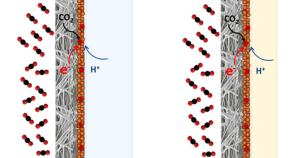Role of electrochemical cell configuration on the selectivity of CuZnAl-oxide-based electrodes for the continuous CO2 conversion: aqueous electrolyte vs. catholyte-less configuration
Authors (first, second and last of 5)

Collection
In order to create a better and more sustainable future for all societies worldwide, the United Nations Member States have created the Sustainable Development Goals (SDGs). To accomplish this, seventeen Sustainable Development Goals (SDGs) were introduced in several subject areas, such as water, energy, climate, oceans, urbanization, transport, science, and technology.
Materials science has considerably contributed to the accomplishment of a number of SDGs, according to report maps of the most recent sustainability initiatives and research within each SDG area. Advanced materials, for instance, could aid in achieving development objectives in key areas such as the life below water (SDG 14), industry, innovation, and infrastructure (SDG 9), sustainable cities and communities (SDG 11), responsible consumption and production (SDG 12), zero hunger (SDG 13), clean water and sanitation (SDG 6), and affordable and clean energy (SDG 7) and climate action (SDG 13). Then, the scientific and technological domains can develop and construct practical solutions in materials and their applications by identifying essential insights to open innovative branches and landscapes for maximizing social benefits.
Consequently, in this Topical Collection, manuscripts related on electrocatalytic materials will be welcome, including all aspects of the creation of novel materials for sustainable energy and environmental technologies, the improvement of drinkable water treatments, antimicrobial activity production, synthetic material approaches, surface modification, organic electrosynthesis, water disinfection, photoelectrocatalysis, electro-sensors, CO2 electroreduction, energy and storage, pollution destruction and monitoring, biological detections and biosensors, integration of nanotechnology, and medical and theoretical chemistry for electrode materials. On the other hand, please note that manuscripts dealing with the Treatment and Remediation about technologies that manage and/or reduce environmental contaminants, including reuse and recycling processes will be included in this thematic Topical Collection.
As the Guest Editor, I would like to invite research groups to contribute with a paper to this Topical Collection. The Topical Collection will feature both critical reviews and research papers of high impact and significance that meet the scope and requirements for publication in Discover Chemical Engineering. Please consult the guide for authors to see if your paper falls within the scope of the journal. Papers out of scope will not be accepted. A review is expected to present a critical overview of the state-of-the-art of a topic, with critically selected examples (not only from your own work), to point the reader to trends and likely future developments and to give a selection of important references to the current literature.
Articles will undergo all of the journal's standard peer review and editorial processes outlined in its submission guidelines
Professor Carlos Alberto Martínez-Huitle, PhD, Federal University of Rio Grande do Norte, Brazil. He received his PhD in Chemical Sciences at the University of Ferrara under supervision of Prof. Achille De Battisti. Currently, he is a Full Professor at the Federal University of Rio Grande do Norte. Research achievements of Prof. Martínez-Huitle were recognized in different years by the Italian Chemical Society, the International Society of Electrochemistry, and the German Government. He is author and co-author of more than 400 scientific publications (Scopus: h-index 53, 15k+ citations) and an editorial member of several journals.


